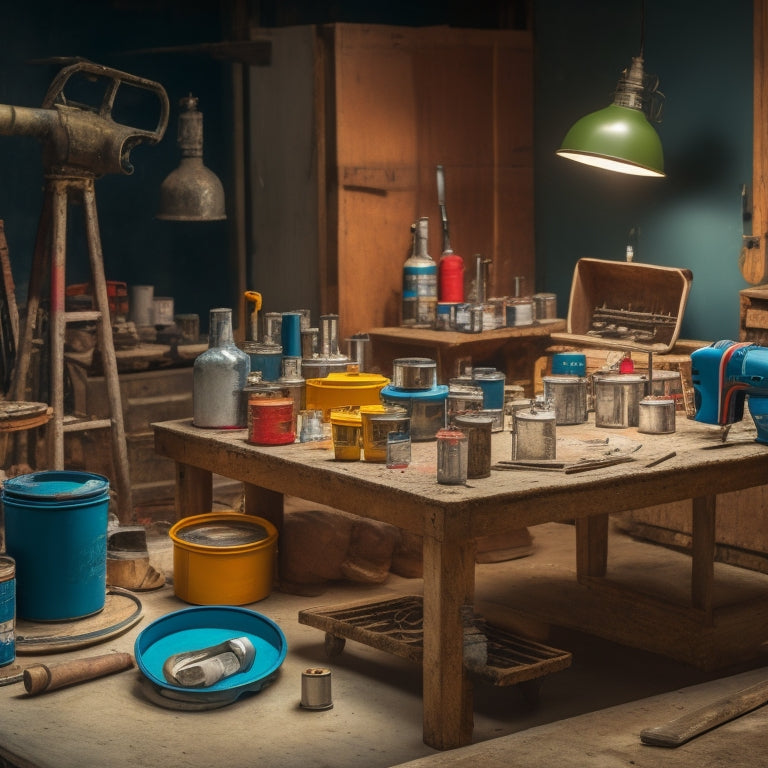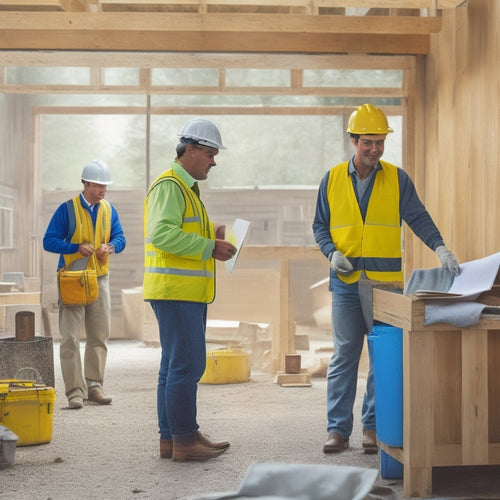
3 Best Mixing Equipment for Home Renovation Projects
Share
When it comes to tackling complex home renovation projects, you need reliable mixing equipment to guarantee high-quality results. The Belle Minimix 150, DeWalt 13-Gallon Mixer, and F2C Pro 1600W Mixer are top recommendations, offering robust drums, high-torque motors, and variable speed controls for efficient mixing. These machines are designed to handle thick, heavy concrete mixes and provide precise control to prevent over-mixing. By selecting the right equipment, you can guarantee smooth mixing, reduce downtime, and achieve professional-grade results. To get the most out of your mixing equipment, consider the essential features and techniques that can make all the difference in your project's success.
Key Takeaways
• For home renovation projects, choose mixing equipment with a suitable drum size to minimize refill frequency and optimize mixing batches.
• Select equipment made from durable materials that resist corrosion and wear, ensuring longevity and reliability.
• Consider planetary mixers with high-torque motors and variable speed controls for efficient and thorough mixing of concrete.
• Robust drums with sturdy construction are necessary for handling demanding concrete projects and ensuring professional-grade results.
• Effective mixing techniques, including understanding mixing times, speeds, and ratios, are crucial for achieving high-quality outcomes in home renovation projects.
Essential Features to Consider
When selecting the best mixing equipment for your home renovation project, you must consider the drum size and material, as they directly impact the machine's capacity, durability, and overall performance. A larger drum size allows for more mix batches, reducing the need for frequent refills, while the material affects the drum's resistance to corrosion and wear.
You'll also want to think about the type of mixing techniques you'll be using, as some equipment is better suited for specific methods, such as slow-speed mixing or high-shear mixing.
In addition to these key features, you should also consider equipment maintenance. Look for machines with easy-to-clean designs and accessible parts to minimize downtime. Regular maintenance is vital to extend the lifespan of your mixing equipment and guarantee consistent results.
Moreover, consider the power source and motor type, as they affect the machine's efficiency and reliability. By carefully evaluating these essential features, you can choose the right mixing equipment for your project, guaranteeing efficient and effective mixing operations.
Top Mixing Equipment for Concrete
With your mixing equipment features in mind, you can now narrow down your options to the top performers specifically designed for concrete, where high-torque motors and robust drums are a must for tackling thick, heavy mixes.
For concrete projects, you'll want to focus on planetary mixers, which utilize a combination of rotating and revolving motions to guarantee thorough mixing. These mixer types excel at handling high-viscosity materials and can handle large batches with ease.
When it comes to mixing techniques, you'll want to employ a slow and deliberate approach to prevent over-mixing, which can lead to weakened concrete. Look for mixers with variable speed controls and adjustable mixing arms to give you precise control over the mixing process.
Top performers in this category include the Belle Minimix 150, the DeWalt 13-Gallon Mixer, and the F2C Pro 1600W Mixer. These machines boast powerful motors, sturdy drums, and intuitive controls, making them ideal for tackling demanding concrete projects.
Efficient Mixing for Home Renovations
To guarantee efficient mixing for your home renovation projects, you'll need to enhance your mixing process by selecting the right equipment and adopting effective mixing techniques. This involves understanding the specific requirements of your project, including the type and quantity of materials you'll be working with.
By choosing a mixer that's compatible with your materials, you'll guarantee a smooth and efficient mixing process. For instance, if you're working with heavy materials like concrete, you'll need a mixer with sufficient power and capacity to handle the load.
Effective mixing techniques are also essential for achieving the desired consistency and quality of your mixed materials. This includes understanding the best mixing times, speeds, and ratios for your specific materials.
Material compatibility is another key factor to take into account, as incompatible materials can lead to poor mixing results or even equipment damage. By mastering these aspects of efficient mixing, you'll be able to complete your home renovation projects quickly, efficiently, and to the highest standards.
With the right equipment and techniques, you'll achieve professional-grade results that will stand the test of time.
Frequently Asked Questions
Can I Use Mixing Equipment for Both Concrete and Drywall Compound?
You're wondering if you can use mixing equipment for both concrete and drywall compound. The answer is, it's not recommended.
Concrete mixers are designed for heavy-duty mixing and can handle thick, dense materials, whereas drywall mixers are made for lighter, more delicate compounds.
Using a concrete mixer for drywall compound can lead to over-mixing, while using a drywall mixer for concrete can result in under-mixing.
It's best to use separate, specialized mixers for each task to guarantee ideal results.
How Do I Properly Clean and Maintain My Mixing Equipment?
You'll want to establish a routine for cleaning and maintaining your mixing equipment to guarantee peak performance and extend its lifespan.
Start by scrubbing the drum and blades with a wire brush to remove dried material, then wash with soap and water.
Regularly lubricate moving parts and inspect for wear.
Implement these cleaning techniques and maintenance tips to prevent corrosion, reduce downtime, and maintain precision in your mixing applications.
Are There Any Safety Precautions I Should Take When Using Mixers?
As you venture into the world of mixing, remember the wise words of Archimedes: 'Give me a firm spot on which to stand, and I'll move the earth.'
But first, guarantee you're standing on firm ground by prioritizing mixer safety.
When handling equipment, always maintain a secure grip, keep loose clothing and long hair tied back, and avoid overreaching.
Make equipment handling a habit by regularly inspecting your mixer for signs of wear and tear, and never leave it unattended while in operation.
Can I Rent Mixing Equipment Instead of Buying It Outright?
When considering heavy-duty equipment, you might wonder if renting is a viable alternative to buying. You're wise to weigh your options.
Rental options can be a cost-effective solution, especially for infrequent or one-time uses. Conduct a thorough cost comparison to determine which approach best suits your needs.
Calculate the rental period, equipment maintenance, and potential downtime against the upfront cost of ownership.
What Is the Ideal Mixer Size for Small to Medium-Sized Projects?
You think you're a master builder, but let's get real, you're probably not mixing concrete for a skyscraper.
For small to medium-sized projects, you'll want a mixer that's not too big, not too small. Aim for a mixer capacity that matches your project scale.
A 3-4 cu. ft. mixer is ideal for most small renovations, while 5-6 cu. ft. is better suited for medium-sized projects.
Anything larger and you'll be wasting space – and concrete.
Conclusion
You've made it to the final stage of selecting the perfect mixing equipment for your home renovation project.
With the right tools, you'll be able to tackle even the most demanding concrete tasks with ease.
According to the American Concrete Institute, 75% of construction projects experience delays due to inadequate mixing equipment, resulting in costly rework and wasted materials.
By investing in one of the top mixing equipment options, you'll avoid these common pitfalls and guarantee a successful, stress-free renovation.
Related Posts
-

3 Best Budget-Friendly Tool Options for Home Renovation
You can achieve professional-looking results in your home renovation project without overspending on tools. For start...
-

3 Best Used Hand Tools for Home Renovation
When tackling your home renovation project, you'll want to prioritize the most essential used hand tools that provide...
-

Selecting the Right Home Renovation Contractor
You're about to invest significant time and money in a home renovation project, so selecting the right contractor is ...


